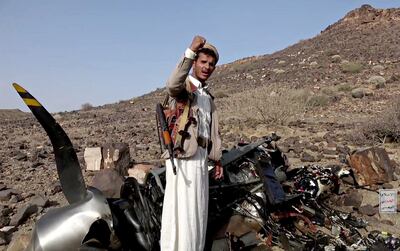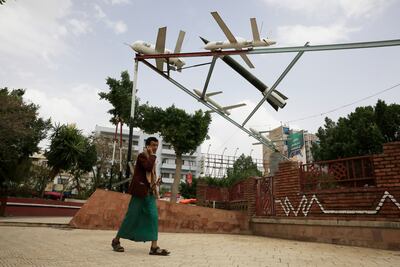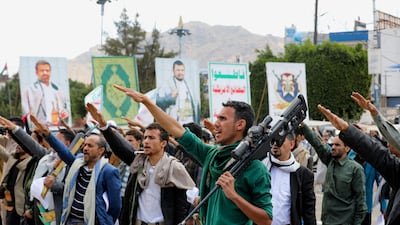Yemen’s rebel leader Abdul Malik Al Houthi said on Thursday that the Houthis would continue attacking ships in the Red Sea that they claim are linked to Israel and the US until a ceasefire in Gaza is achieved.
His comments came after the Houthis announced they were bracing for retaliatory action by the UK and the US after the rebels rejected offers of incentives to stop the attacks.
“The solution is to stop the war against the Gaza Strip and end the siege,” said the Houthi leader in a televised speech.
“Our people will not stop until this war ends, and we are preparing for a … round of escalation if the aggression continues,” he added, without elaborating.
Since the outbreak of Israel's war in Gaza in October, the rebels, who control the Yemeni capital of Sanaa and territories in the north and west, launched dozens of attacks on international shipping in the strategic waters off Yemen.
The group claimed the attacks were being carried out in solidarity with Palestinians and their ally Hamas in the coastal enclave, demanding an end to Israel’s devastating war, which has killed more than 35,500 people.
The attacks in the Red Sea have disrupted global shipping, forcing companies to reroute to longer and more expensive journeys around southern Africa.
In the UK, the manufacturing industry suffered a downturn last month due to the Red Sea crisis. The influential S&P Global/CIPS UK manufacturing PMI survey dropped to 49.1 in April, having hit a 20-month high of 50.3 the previous month. Any reading above 50 means a sector is in growth, while a score below this means it is contracting.

The next round
Mr Al Houthi said his Iran-backed armed group had carried out 156 attacks against Israeli, American and British targets since the war started, including 107 on ships. Eight of those attacks were in the last week alone.
This threat to Israel and a strategic shipping route has prompted retaliatory strikes by the US and Britain since February.
Those strikes killed 40 Houthi fighters and wounded 35 others, according to their leader, who claimed “the Americans, despite their efforts to prevent the launching of missiles and drones, failed miserably to prevent us from hitting targets”.
Last week, The National quoted Yemeni political sources as saying the Houthis have dismissed incentives proposed by the US to curb their attacks in the Red Sea. These incentives included the end of blockades on the capital Sanaa and Hodeidah port in the west, and speeding up peace talks.
The most recent rebel attack, before the latest wave started a week ago, had been on April 10.
Hamas and Israel are currently negotiating a ceasefire in Gaza. The deal being discussed, brokered by the US, Egypt and Qatar, would see the release of dozens of hostages in exchange for a six-week halt in fighting as part of an initial phase, according to several diplomatic sources. Hundreds of Palestinian prisoners held by Israel, including some serving long sentences, would also be released
But the Houthi leader warned that stopping the war in Gaza, which broke out following the Hamas attacks in Israel that killed around 1,200 people, won’t bring their conflict with Israel to an end.
“When we reach the end of this round with the Israeli enemy, the conflict will continue, and we are beginning to prepare for the next round,” he said in his speech.


